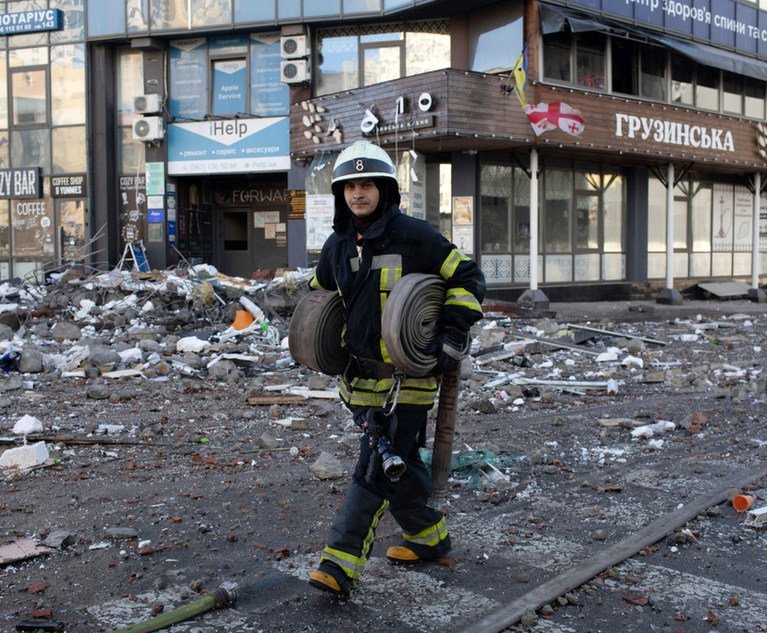Ukrainian Legal Tech Companies Continue On Under Cloud of Russian Invasion
Since the beginning of the war, many legal tech founders and their employees have relocated, traded in their cubicle for a home office or started working periodically from a bomb shelter.

Even with a Russian invasion of their country, founders and members of Ukraine-based legal tech companies are continuing to code.
To be sure, it’s not purely work that fuels their efforts, but a need to support their country and an urge to gain back some level of normalcy. But working from home is very different when your country is at war.
“Everyday I work until 5 a.m., I keep nearby all necessary things that I need in the bomb shelter,” wrote Regina Bondarenko, CEO of Ukraine-based legal chatbot and legal document automation provider Pravoman and co-organizer of Kyiv Legal Hackers, in an email. “Now my morning starts not with coffee [and] a delicious dessert but a siren that warns of an air [raid] alarm,” she added.
To be sure, Ukraine is home to a growing tech startup community that also includes many legal tech providers, noted Cornell Law School professor and Ukraine tech startup venture founder Charles Whitehead. “I think the one thing folks may be less familiar with in the U.S. is, up until the war and during the war, this is a very vibrant tech startup community and it only happened in the last three years.”
However, since the beginning of the war, many legal tech founders and their employees have relocated, traded in their cubicle for a home office or started working periodically from a bomb shelter.
Bondarenko and her Pravoman team, for example, were based in Ukrainian cities Kyiv and Dnipro. After Russia began its invasion last month, Bondarenko said she and her team left Kyiv and moved to western Ukraine while others stayed in Dnipro, in central Ukraine.
AXDRAFT’s Ukraine-based team, which was acquired by Onit Inc. in 2020, also initiated its emergency action plan and transferred its employees to Lviv, Ukraine, and Frankfurt, Germany, and set up satellite offices, said AXDRAFT co-founder and general manager Yuriy Zaremba during an interview with Legaltech News.
To provide “some separation from home and work,” employees can work from the Lviv office, Zaremba noted. However, they must leave the office by 5 p.m. because “we have interruptions from time to time when we have air strike alerts, but other than that, business as usual,” Zaremba said.
But it’s not a normal work experience. Legal tech leaders noted the realities of war can’t be ignored by software developers or their clients.
“It’s impossible to behave as if nothing has changed,” Zaremba noted. However, he told his team that they didn’t have to be overwhelmed by fear. Instead, they also had the option to work to try and get their minds off of the fighting, or do something to support the effort. ”We are not on the front line, [but] we can support our fellow Ukrainians every way we can, it’s up to us,” he noted.
Zaremba tries not to let fear or work overcome him. “For myself, I give 5% to fear, 80% to work and 15% to support. That’s how I distribute those three for myself. That’s the message I give to the team and that’s how they see it as well,” he said.
To be sure, as AXDRAFT and other Ukraine-based legal tech developers balance business and uncertainty surrounding the war, legal tech isn’t a top concern for many Ukrainian clients.
“We have been going through this crisis very well [but] there are also national legal tech companies that were essentially servicing exclusively Ukrainian clients or [leveraging] Ukrainian data—their services have been suspended at this time. Essentially, no one is buying legal tech services in Ukraine,” Zaremba said. He also noted AXDRAFT is pausing its billing to Ukraine-based clients in light of the war.
While the conflict has brought disarray and dangerous conditions to the country, legal tech companies with Ukraine-based operations said they weren’t too concerned about possible disruptions of their IT networks from Russian hackers.
“Our products rent services in the Netherlands, so there are no problems with downtime. The only problem today is internet outages due to congestion and destruction,” Bondarenko said.
She added that she worried more about the damages that can’t be replaced. ”Our main fear is the loss of team members, their death,” she said. “Unfortunately, this is a much more real and uncontrollable risk.”


